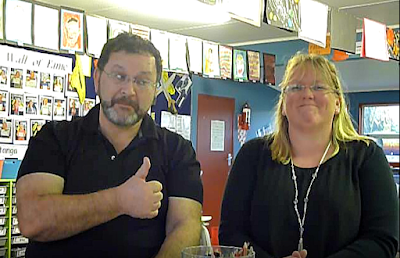Activity 4: Legal and ethical contexts in my digital
practice
Watching the video presentations took me back to a
conversation I was part of in a conference in Melbourne a number of years ago.
Videos viewed course material
As part of a discussion we had in a group session led by Jennifer Abrams (a communications consultant – her workshop was A Multi-Generational
Workforce) a question was raised by a member of the group who was trying to
work around how to deal with a young teacher who was an active social media
user who didn’t see anything wrong with sharing personal and work information
on Facebook. There was the added complication that she had also had as friend’s
parents of children she taught or had taught as well as teachers from her own
school and other schools.
It made for interesting discussion, especially
around the aspect of social profiles and an aspect I hadn’t really thought about
– employers looking at employee (or potential employee) accounts.
I have used the outline from Connecticut’s Teacher Education and Mentoring Program. (2012) to guide
my thinking.
- What possible issues/concerns might this
scenario raise?
There is a number of issues and concerns
around this scenario. There is the sharing of information that could compromise
either the young teacher/the school/members of the school community/students.
The young teacher could be opening themselves up for attack from a disgruntled parent.
There is no privacy for the teacher in her public/private life. On line bullying
may occur and there is a possibility that online “friends” may perceive some of
her comments as bullying/bad taste/judgemental etc.
- How could this situation become a violation
of the law, the “Code” or other school /district policies?
If information/photos are shared online of
situations that be a violation of the law (even if done in jest) or could be
perceived as anti-establishment or anti community, it may jeopardise the
teachers position within the school. Complaints could be made by parents to the
school if photos or postings are deemed as inappropriate.
- In this situation, what are some potential
negative consequences for the teacher, for the students and the school
community?
Negative consequences for this teacher could
range from loss of her job, future difficulty in being employed, difficulty in maintaining
a professional relationship with parents/colleagues and possibly students. The
teacher could become a target for on line bullying and stalking.
- What responses/actions will result in a
more positive outcome and/or what proactive measures might be considered?
Again, looking back at the conference, I
attended, one of the other workshops I attended was also by Jennifer Abrams and
was around having hard conversations. If ever there was to be a hard
conversation – this would be it.
I believe the best for me to do if I had
to approach a teacher where their professionalism was potentially going to be
compromised would be taking the time to script a conversation based on the
following points, keeping the conversation non judgemental or personal.
Scripting
a Conversation
The table below, found in Chapter 6, in
Abrams book Having Hard Conversations outlines the suggested steps for
scripting a hard conversation.
References
Abrams. Jennifer,
(2009). Having Hard Conversations. Corwin
Connecticut’s
Teacher Education and Mentoring Program. (2012). Ethical and Professional
Dilemmas for Educators: Facilitator’s Guide: Understanding the Code of
Professional Responsibility for Educators. Connecticut, US: Author. Retrieved
from https://www.ctteam.org/df/resources/Module5_Manual.pdf




